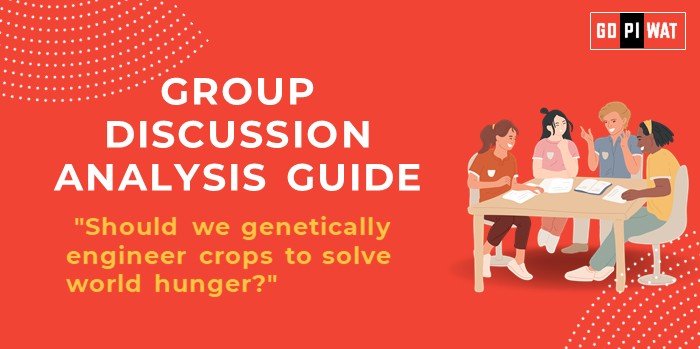📋 Group Discussion (GD) Analysis Guide
🌐 Introduction to “Should we genetically engineer crops to solve world hunger?”
- Opening Context: World hunger affects over 828 million people globally (FAO, 2023). Genetically engineered (GE) crops, with their potential to increase yields and resist harsh climates, emerge as a critical debate point in addressing this crisis.
- Topic Background: Since the introduction of GE crops in the 1990s, innovations like pest-resistant Bt cotton and golden rice fortified with Vitamin A have showcased the potential to combat food insecurity. However, ethical, environmental, and economic concerns persist.
📊 Quick Facts and Key Statistics
- 🌍 Global Hunger: 828 million people suffer from chronic hunger (FAO, 2023).
- 🌱 GE Crops Adoption: Over 190 million hectares globally were planted with GE crops in 2022 (ISAAA).
- 📈 Crop Yield Impact: Bt cotton increased yields by 30% in India, reducing pesticide use by 50%.
- 🍎 Food Losses: Up to 40% of global food production is lost to pests and diseases annually (UN FAO).
👥 Stakeholders and Their Roles
- 🏛️ Governments: Policy creation, subsidies, and public awareness campaigns.
- 🏢 Biotech Companies: Development and commercialization of GE seeds.
- 🌾 Farmers: Adoption and feedback on efficacy and affordability.
- 🛍️ Consumers: Public perception and market demand for GE products.
- 🌍 NGOs and Advocacy Groups: Monitoring ethical and environmental implications.
🏆 Achievements and Challenges
✨ Achievements:
- 🛡️ Reduced crop losses: GE crops like pest-resistant corn and cotton significantly cut pesticide usage.
- 🍚 Nutritional enhancement: Golden rice addresses Vitamin A deficiencies, potentially saving millions of lives.
- 🌞 Climate resilience: GE crops engineered for drought tolerance aid in mitigating climate change effects.
⚠️ Challenges:
- 🧬 Ethical concerns: Gene editing raises fears of “playing God.”
- 🌱 Environmental risks: Potential loss of biodiversity due to monocropping of GE varieties.
- 💰 Economic barriers: High costs of GE seeds for small-scale farmers.
🌍 Global Comparisons:
- ✅ Success: Brazil’s adoption of herbicide-resistant soybeans boosted exports while reducing environmental degradation.
- 🚫 Challenges: The European Union has heavily restricted GE crops due to public resistance.
📖 Case Studies:
- 🇮🇳 India: Bt cotton increased farmer incomes but faced criticism over affordability and dependency on biotech firms.
📄 Structured Arguments for Discussion
- Supporting Stance: “Genetically engineered crops can address global hunger through higher yields, better nutrition, and climate resilience.”
- Opposing Stance: “Ethical concerns, environmental risks, and economic disparities outweigh the potential benefits of GE crops.”
- Balanced Perspective: “While GE crops offer promising solutions to world hunger, they must be accompanied by ethical oversight and equitable distribution systems.”
💡 Effective Discussion Approaches
- Opening Approaches:
- “As world hunger persists, should we leverage genetic engineering to ensure food security, or are the risks too great?”
- “With over 190 million hectares of GE crops already cultivated, their potential in addressing hunger cannot be ignored.”
- Counter-Argument Handling:
- “While GE crops raise ethical concerns, strict regulatory frameworks can ensure safety and equitable access.”
🔍 Strategic Analysis of Strengths and Weaknesses
- Strengths:
- High yield potential and pest resistance.
- Improved nutrition through biofortification.
- Weaknesses:
- High dependency on biotech firms.
- Public distrust and misinformation.
- Opportunities:
- Developing GE crops tailored for specific regions.
- Global collaboration for research and ethical guidelines.
- Threats:
- Monopolization by corporations.
- Potential for unforeseen ecological effects.
📚 Connecting with B-School Applications
- Real-World Applications:
- Case studies on sustainable agriculture and CSR initiatives.
- Impact on global supply chains and agribusiness management.
- Sample Interview Questions:
- “What role do biotech firms play in ensuring food security?”
- “How can GE crops contribute to sustainable development goals?”
- Insights for B-School Students:
- Understanding ethical dilemmas in innovation.
- Exploring supply chain efficiencies in the agri-food sector.


